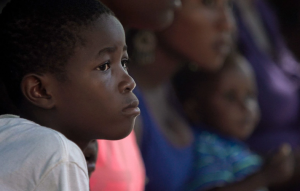Children are often among the disenfranchised grievers in the family because their grief responses are not readily identified by the adults around them. As a result they are not acknowledged as part of the grieving family unit. It is quite common for someone comforting a grieving family to offer condolences to the adults, and then say something to the child, to the effect of, ‘Boy, you’re really growing fast!. Or, at the other extreme, they put the child on the spot by asking them to verbalize their feelings about the death.
It is important to understand that children are as affected by a death as deeply as other family members, even though their mourning process manifests differently. For example, a child may not cry upon being told of a death. Often the child will listen to what is said and then go out to play or go to sleep. This lack of tears signals to the adults that the child either doesn’t understand or is unaffected. However, an observant caregiver may notice changes in the child’s behaviour or play such as uncharacteristic aggressiveness or behaviours such as thumbsucking or bedwetting in a child who has passed that stage. It is important that caregivers inform teachers or other external caregivers about what has happened. As surprising as it may sound, families often neglect to share this information with the school.
The Dougy Center for Grieving Children in Portland, Oregon shares the following tips for supporting a grieving child:
Answer the questions they ask, even the hard ones
Kids learn by asking questions. When they ask questions about a death, it’s usually a sign that they’re curious about something they don’t understand. As an adult, a couple of the most important things you can do for children is to let them know that all questions are okay to ask, and to answer questions truthfully. Be sensitive to their age and the language they use. When a child asks what happened, use concrete words such as “died” or “killed” instead of vague terms like “passed away.” A young child who hears his mother say, “Dad passed away” or, “I lost my husband,” may be expecting that his father will return or simply needs to be found.
Give the child choices, whenever possible
Children appreciate having choices as much as adults do. They have opinions, and feel valued when allowed to choose. And they don’t like to be left out. For example, it is a meaningful and important experience for children to have the opportunity to say goodbye to the person who died in a way that feels right to them. They can be included in the selection of a casket, clothing, flowers and the service itself. Some children may also want to speak or write something to be included in the service, or participate in some other way.
Talk about the person who died
Remembering the person who died is part of the healing process. One way to remember is simply to talk about the person who died. It’s okay to use his/her name and to share what you remember. You might say, “Your dad really liked this song,” or “Your mom was the best pie maker I know.”
Bringing up the name of the person who died is one way to give the child permission to share his or her feelings about the deceased. It reminds the child that it is not “taboo” to talk about the deceased. Sharing a memory has a similar effect. It also reminds the child that the person who died will continue to “live on” and impact the lives of those left behind.
Children also like to have keepsakes of the person who died, such as objects which hold an emotional or relational significance.
Respect differences in grieving styles
Recognizing that each person grieves in his own way is essential to the healing process for a family. Children often grieve differently from their parents and siblings. Some children want to talk about the death, while others want to be left alone. Some like to stay busy and others withdraw from all activities and stay home. Younger children may be clingy, whereas teens may prefer to spend time on their own or with peers. Recognizing and respecting that each child grieves in his or her own way is essential to the healing process for a family. Listen to children talk about their feelings and watch their behaviour, and you will help clarify and affirm these natural differences.
Listen without judgement
One of the most helpful and healing things we can do for a child is to listen to his or her experiences without jumping into judge, evaluate or fix. Well-meaning adults often try to comfort a child with phrases such as, “I know just how you feel,” or, worse, advice such as “get over it” or “move on.” While our intentions to soothe a grieving child are correct, using such responses negate the child’s own experiences and feelings. If a child says, “I miss my Dad who died,” simply reflect back what you’ve heard, using their words, so they know that they’re being listened to. Use open-ended questions such as “What’s that been like?” or “How is that?”; children are more likely to share their feelings without pressure to respond in a certain way. This is just one way we can validate their experiences and emotions, helping them regain a sense of safety, balance and control.
Hold a memorial service and allow for saying goodbye
Allowing children and teens to say goodbye to the person who died is important in beginning the grieving process. A service enables children and teens to see how valued and important the person was to others and know that grieving the loss is okay. Before the service, let children know what is going to happen, who will be there, where and when it takes place and why it’s important. Children who are prepared with this information are able to make the choice about attending the funeral. Should they choose not to participate, invite them to create their own commemorative ritual or activity for saying goodbye—planting a flower or tree, holding a candle-lighting ceremony.
Take a break
Children grieve in cycles. For example, they may be more inclined to play and divert their focus from the death when the death is recent and parents are grieving intensely. More than adults, children need time to take a break from grief. It is important to know that it’s okay to take a break. Having fun or laughing is not disrespectful to the person who died; this is a vital part of grieving, too.
These tips have been adapted from the book 35 Ways to Help a Grieving Child, available on the Dougy Center website at www.dougy.org






